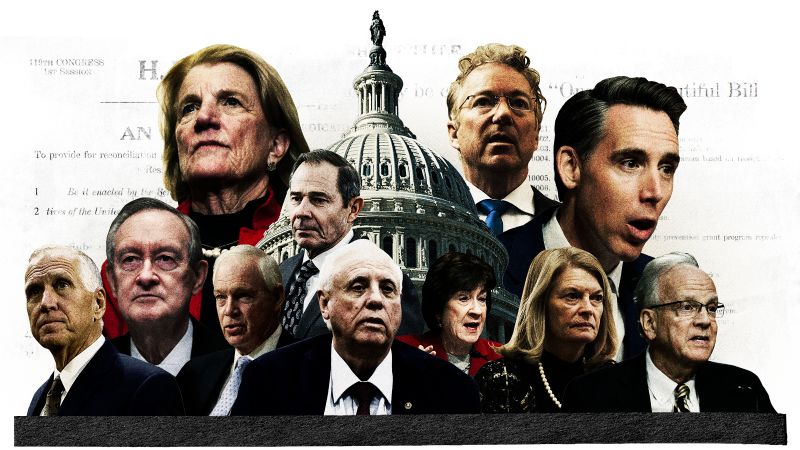The ongoing legislative efforts of congressional Republicans to push President Donald Trump’s ambitious agenda through the U.S. Senate – with a notable deadline of the Fourth of July – have sparked significant negotiations and debates. As Republican lawmakers grapple with the complexities of the House-passed bill, a notable divide has emerged among them concerning the proposed amendments. The challenge for Senate Majority Leader John Thune is substantial; he can only lose three votes and must bridge the widening gap between conservatives, who advocate for stringent spending cuts, and those who are concerned that cuts to critical programs like Medicaid and clean energy tax credits may be excessively harsh.
Moreover, these negotiations have been intertwined with public commentary from influential figures such as Elon Musk, who has criticized the House bill, potentially complicating the Senate’s approach further. A bill that emerges from the Senate must also secure House approval, posing an additional layer of complexity in the legislative process before it can reach the President’s desk for ratification into law.
Senators have voiced their concerns regarding the potential impacts of the proposed changes. New provisions aiming to reform Medicaid and the methods states employ to levy taxes on healthcare providers have drawn scrutiny. These changes, along with accelerated implementation of new work requirements, were instrumental in gaining support from conservative factions within the House. However, some GOP senators are emphasizing the need for a careful examination of how these changes would affect their constituents, expressing hesitations that conservative House members might lose ground due to backtracking on these vital proposals.
For instance, one senator highlighted the urgency surrounding Medicaid with a statement focused on constituents who legally reside in his state. With 1.3 million Missourians dependent on Medicaid or CHIP, the proposed reforms pose a critical concern. Similarly, another senator indicated that the provider tax is crucial for states, emphasizing that any alterations could detrimentally impact nursing homes and healthcare access. Overall, there is a clear recognition among several lawmakers that the proposed Medicaid cuts require additional scrutiny to ensure they do not negatively affect vulnerable populations.
Further complicating the negotiations are broader concerns relating to federal spending and the national deficit. A faction of Senate Republicans has asserted that the House bill fails to sufficiently address the country’s fiscal challenges. This sentiment gained momentum following a report by the Congressional Budget Office projecting a $2.4 trillion increase in the deficit over the next decade, causing some senators to question how they can support a bill that exacerbates long-standing fiscal issues.
Within this context, notable Republican figures have expressed their criteria for supporting broader initiatives, stressing the necessity for responsible financial stewardship. For example, one senator indicated that the recent fiscal projections might impede his ability to rally behind the proposed legislation. While another has conveyed a willingness to engage with the bill under stricter conditions tied to addressing the core issues of the deficit.
Attention also remains focused on the rollback of clean energy tax credits, a topic that initially galvanized some conservative lawmakers in the House. There are shifting sentiments in the Senate regarding these credits, as lawmakers are increasingly aware of their implications for job creation and economic growth within their states. Senators have expressed a desire to foster a careful, deliberative approach to any phase-outs of tax incentives that support clean energy investments, acknowledging the balance needed between transitioning energy priorities and maintaining economic stability.
Lastly, issues surrounding state and local tax deductions loom large. Republican representatives from high-tax states have pushed for significant increases in how much taxpayers can deduct from federal returns. However, without representation from such states in the Senate, Republican lawmakers are wary of the financial implications of proposed enhancements to SALT deductions. While some senators have expressed opposition to elevating the concessions demanded by their peers, they acknowledge the necessity of integrating financial prudence and state-specific considerations into ongoing negotiations.
In summary, current legislative efforts present a complex, multifaceted challenge for Senate Republicans as they strive to align their priorities while navigating the diverse interests within their ranks. Balancing fiscal responsibility with the needs of their constituents will be essential in shaping the passage of Trump’s agenda and determining the implications for health care and tax policy in the United States.



